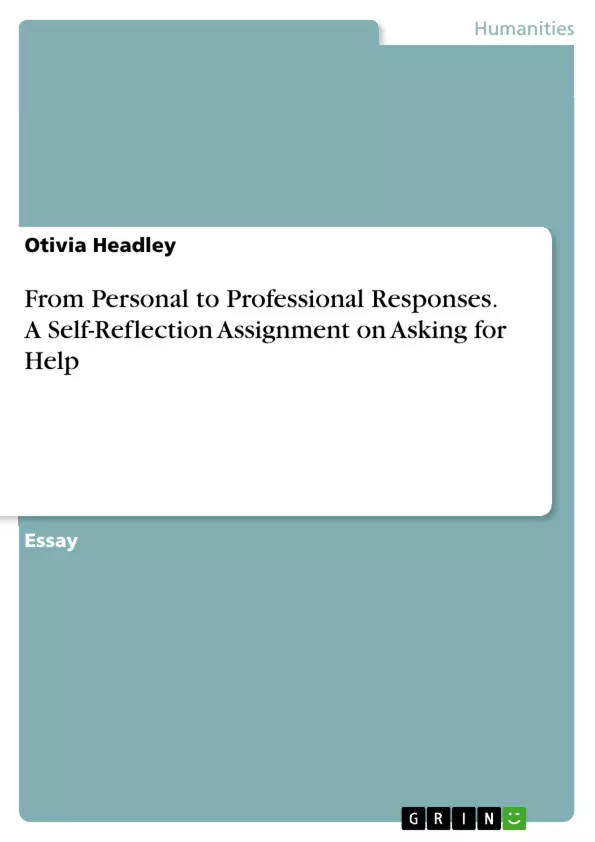Research has found that the ability to connect with people who are different from us comes from being comfortable and understanding ambiguity of social/ethnic and personal identities. In order to help someone socially different from me I’d have to accept that everyone doesn’t have the same circumstances or background as I do.
Being aware of differences in others can impact my view on dynamics of power and privilege because it makes people in power use it for good. Self-awareness can help the understanding that assisting someone socially different from me not only helps his or her problem, it also makes me a better person for using my superior knowledge for the better of society.
Looking back at my own experience, I conclude that being self-aware can immensely impact how you are viewed when helping others. Being able to be relatable and reassuring the person you are there to help them through an issue and not there to belittle or judge them can be refreshing to hear.
Understanding power and privilege and the roles that are associated with each of them, using knowledge for the better of society rather than as a way to oppress individuals and project ignorance on to them can be the difference between people viewing you as someone that they would return for help or someone that they would never go to again.
Inhaltsverzeichnis (Table of Contents)
- Asking For Help: A Self-Reflection Assignment: Personal to Professional Responses
- My Experience with Asking for Help
- Learning from My Experience
- Social Work Practice and Dynamics of Power and Privilege
- Personal Reflection: Moving Forward
Zielsetzung und Themenschwerpunkte (Objectives and Key Themes)
This assignment aims to provide a self-reflection on the author's personal experience with asking for help and its implications for social work practice. The author explores the dynamics of power and privilege in the context of seeking assistance, while drawing upon theoretical frameworks and research to inform their insights.
- The importance of self-awareness and confidence in seeking help
- The role of social support and its impact on individuals
- The dynamics of power and privilege in helping relationships
- The ethical implications of using knowledge and resources for the benefit of others
- The importance of empathy and understanding in social work practice
Zusammenfassung der Kapitel (Chapter Summaries)
- The author recounts a personal experience of seeking help from family members while preparing a personal statement for graduate school. They highlight the challenges of self-doubt and anxiety and describe how their family's support helped alleviate these feelings.
- This chapter focuses on the author's key takeaways from their experience. They emphasize the importance of self-confidence, the value of asking for help, and the potential for expanded knowledge and perspective through collaboration.
- Drawing upon their experience, the author discusses the dynamics of power and privilege in helping relationships. They analyze how their family's superior knowledge was used to empower rather than oppress them, highlighting the ethical implications of using power for the benefit of others.
Schlüsselwörter (Keywords)
This assignment delves into the themes of self-reflection, social work practice, asking for help, power and privilege, social support, empathy, and ethical considerations. The author explores the role of these concepts in navigating helping relationships and the implications for social work practice.
Frequently Asked Questions
What is the primary focus of this self-reflection assignment?
The assignment focuses on the author's personal experience with asking for help and how this reflection informs social work practice, specifically regarding power and privilege.
How does self-awareness impact the process of helping others?
Self-awareness helps individuals understand that assisting someone different from themselves not only solves a problem but also contributes to the better of society and personal growth.
What role do power and privilege play in social work according to the text?
The text emphasizes using knowledge and power for the benefit of society rather than as a tool for oppression or projecting ignorance onto others.
Why is relatability important when offering assistance?
Being relatable and reassuring helps the person receiving help feel judged-free and supported, which is essential for a positive professional relationship.
What are the key themes explored in the chapter summaries?
The themes include the challenges of self-doubt and anxiety, the value of social support, and the ethical implications of using superior knowledge to empower others.
- Quote paper
- LMSW Otivia Headley (Author), 2012, From Personal to Professional Responses. A Self-Reflection Assignment on Asking for Help, Munich, GRIN Verlag, https://www.grin.com/document/345104



